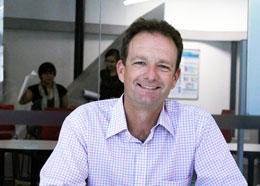Odyssey House NSW has provided care to people struggling with addiction for over 40 years. Now, for the first time, the impact of its well-known residential rehabilitation program has been confirmed by independent research.
The findings of the study by the University of Technology Sydney (UTS) are helping the not-for-profit organisation make its case for funding to donors and governments, while also supporting the case for new treatment options.
“Odyssey House has a great reputation across the sector,” says Associate Professor Toby Newton-John of the University of Technology Sydney (UTS), a clinical psychologist who led the research. “But they wanted to evaluate their existing programs and build the evidence base for the positive story they have to tell.”
Odyssey House was founded in 1977 by Sydney businessman Walter McGrath after the death of his son from a heroin overdose. In the decades since then it has grown into one of Australia’s largest rehabilitation services, with more than 35,000 people having taken part in its various programs.
The UTS study focused on the 117 people who took part in its residential program in Sydney between July 2017 and July 2018.
The residential program treats about 100 people a year for severe alcohol and other drug problems, using a ‘therapeutic community’ model where residents not only aim to help themselves but also support their fellow residents.
During the 12-month program residents work with counsellors and medical staff while progressing through stages where they gradually assume the day-to-day administration and running of the residence – taking on jobs such as maintenance, gardening, cooking, driving and administration.
The researchers wanted to know whether the program improved the physical and mental wellbeing of the participants, and to what degree those gains were maintained three, six, nine and 12 months afterwards.
More than half of the 117 individuals identified as users of multiple drugs in the month before their entry into the program. Amphetamines, or ice, was the most common primary drug of concern to them, says Dr Newton-John.
They had a median age of 32. Nearly 60 per cent had a criminal history, just over 40 per cent left school at Year 10 or earlier, and over 60 per cent were assessed as being in moderate-severe psychological distress upon entry.
Analysis of the data is continuing, but preliminary results show participants achieving significant reductions in drug dependence between program entry and departure, with improvements in mood and quality of life being maintained 12 months later, and social functioning continuing to improve in the year after the program.
However, the study also found that most of the gains were made in the initial stages of the program, with a plateau in the final three months of residence.
Many people left treatment early, as is common in such programs, but Dr Toby Newton-John says the researchers found the reasons were not to do with the program but related to family, finances and physical health.
A preliminary analysis of those who did depart has identified that people who went into the residential program from a prior detoxification program were more likely to leave early. They were also less likely to have education beyond Year 12.
“But, interestingly, that’s the only difference we’ve found,” Dr Newton-John says. “Not age, not gender, not primary drug of concern, not number of years of drug addiction – none of those things made a difference. It’s very individual,” he says.
The researchers were also interested in participants’ reflections over time, and noted that while some clients commented negatively at separation that the program had ‘a lot of rules’, by six months that had morphed into positive statements along the lines that it was ‘hard but worth it’.
Odyssey House Chief Executive Julie Babineau says the reasons behind addiction are complex and individual. “This research has helped us understand some of these complexities so we can offer more effective treatments to as many people as possible,” she says.
The service recently instituted a 12-week Foundations to Recovery Program for less complex clients who require residential treatment but are likely to have those needs met in an intensive, shorter program.
Dr Newton-John says the research showed people don’t make continuous, linear progression over time. “That’s something the team at Odyssey House had a sense of, but I think being able to put numbers on that gave them confidence to look at new formats.
“If it’s possible to get equivalent outcomes with a ‘lower dose’ of treatment, that’s more efficient and cost-effective – and it frees up space for somebody else,” he adds.
Dr Newton-John says a byproduct of the study has been a growing appetite for research among Odyssey House staff, who are now interested in knowing more about the people who present with addiction in tandem with chronic pain and might need a different sort of help.
Research team
-
Associate Professor and Deputy Head of School – Research, Clinical Psychology
Faculty
- Clinical Psychology, Graduate School of Health
Partner
- Odyssey House NSW


